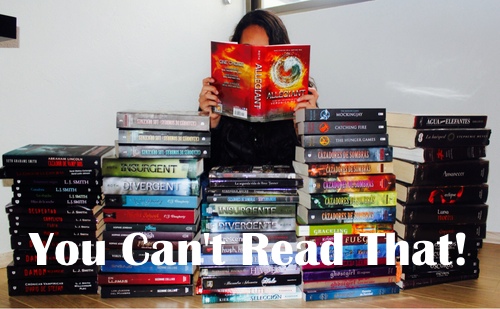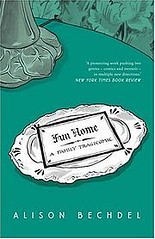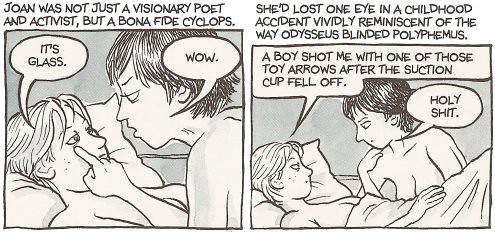You Can’t Read That! is a periodic post featuring banned book reviews and news roundups.

Brunswick County NC school officials, in the wake of yet another parental challenge to Sherman Alexie’s young adult novel The Absolutely True Diary of a Part-Time Indian, have decided the book will stay on the shelves of a middle school. One parent, though, is continuing her campaign to have the book removed, characterizing it as “Filth, pure filth.” Can this parent possibly have read the book? I read it and don’t remember any filth. Here’s my review, ICYMI.
Here’s an interesting article describing a Florida county school board’s procedures for evaluating and acting on parental book challenges. Sounds like these particular administrators like literature and have a clue.
Sadly, here’s the negative school board story to undo the previous two positive ones. Said at a Ringgold PA school board meeting where Margaret Atwood’s The Handmaid’s Tale was challenged and quickly banned, and I quote:
Baertsch suggested the board read the book before passing judgment, but Kennedy interrupted her, saying, “I don’t read Penthouse and I won’t read this.”
Contemptible. And typical.
The attempted murder of a teenaged girl by two other teenaged girls who were acting out a crowdsourced story featuring a villain named the Slender Man has led to calls for the banning of crowdsourced online fiction. Crowdsourced fiction sounds a lot like fan fiction to me, so I’m not sure how that would work. I guess you could shut down the internet. Good luck with that.
Speaking of the Slender Man, how common is it for wanna-be book burners to blame crimes on books? One would think it would be one of their favorite tactics, but a quick Google search doesn’t turn up much. Yes, comic books have been blamed for youth crime, along with video games and music, but books? Not in recent years, it seems. And if they aren’t blaming criminality on books, then why are they trying to ban them?
A related thought, from a New Statesman article on the history of literary censorship:
A more legitimate literary objection to censorship is its implicit portrayal of a reader as the sort of person who jumps off a cliff when asked. Notions such as “obscenity” or “abasement before the west” make literary language a tool of subversion and ascribe to the novelist the hypnotist’s capacity for making a previously obedient or prudish member of the public throw stones or unzip.
This story made me think: the staff of a Chicago area public library invited a pro-Palestinian speaker to give a public talk, then disinvited him because they couldn’t find a pro-Israeli speaker to provide “balance.” After a storm of protest they re-invited him and the talk is back on. So here’s what I’m thinking: might this presage a new direction in book banning campaigns? What if book banners, after challenging books on school and public library shelves and being defeated, start demanding balance as compensation? One Chick tract for every YA novel, one copy of The Turner Diaries for every copy of To Kill a Mockingbird? Hey, you read it here first!
Word. Count on it. When censorship is permitted, gay books will be censored.
I mentioned in a previous YCRT! column my fear that trigger warnings, should we start applying them to books, might result in unprecedented waves of book banning directed at schools, colleges, even public libraries and book stores. Even though most book banners don’t read the books they go after (“I don’t read Penthouse and I won’t read this”), trigger warnings would give them a blanket excuse never ever to read books in certain trigger warning categories. The kiss of death, when it comes to trigger warnings on books, would be any mention of homosexuality, which brings me to the …
YCRT! Banned Book Review
 Fun Home
Fun Home
Alison Bechdel
![]()
I’ll admit up front to a snobbish attitude toward graphic novels. I was raised to think they were for people who don’t like to read. Still, I’m willing to expand my horizons, and when I learned the theme of this year’s Banned Books Week (September 21-27, 2014) is to be graphic novels, I pressed members of my book club to pick one for our September selection. I went a step further and recommended Alison Bechdel’s Fun Home. We have agreed to read a graphic novel that month; whether it’ll be Fun Home or another selection remains to be seen. I decided to read it anyway, and borrowed a copy from my local library.
You’ve probably heard of the Bechdel Test, a feminist litmus test for movies. To pass the test, a movie must have:
- At least two woman in it, who
- talk to each other about
- something besides a man
Yes, this is the same Alison Bechdel.
Fun Home is Bechdel’s memoir of her childhood and college years. It’s about her family … her father, mother, and two brothers … and focuses most tightly on her relationship with her father, a troubled man, and her discovery of her own sexuality. This is no comic book; it’s a surprisingly literary and deep self-examination, filled with references and hints that drive you deeper into the text and illustrations. Although it’s a fast read, it’s also a demanding read, not at all what my inner snob was expecting.
Fun Home is touching and extememly personal … I was moved in places, particularly those sections where Bechdel revisits key interactions with her father, showing how her understanding of his complicated character grew as she herself got older. She seems to hold little back; her depiction of a distant relationship with her father doesn’t hide her love for him (I know that’s speculative on my part, but Alison Bechdel made me believe it).
I rarely feel as if I’ve truly shared an author’s humanity, especially not across gaps of gender and sexuality; given that I finished this book knowing only what Alison Bechdel wanted me to know, I was convinced she had shared most of herself with me. I felt connected, and it enriched my appreciation of this book.
When I gather material for new YCRT! columns, I search Google for news articles about book challenges and banning attempts. This is how I first learned of Fun Home, reading articles about attempts to ban or restrict it.
Since its publication in June 2006, would-be censors have repeatedly tried to have Fun Home removed from libraries and school reading lists. The first challenge came just months after publication, in October 2006: residents of Marshall, Missouri tried to have the book removed from the public library. The book was removed but eventually reviewed and reinstated. In 2008 a University of Utah English professor added it to a class reading list. A student objected, and even though the professor gave the student an alternate reading assignment, the student contacted a local organization called “No More Pornography,” which started an online petition calling for the book to be removed from the syllabus (the university stood its ground). Most recently, Fun Home has been challenged in South Carolina, where it was included as a summer reading selection for incoming freshmen at the College of Charleston. Organized religious groups like Focus on the Family and the Family Research Council became involved, and though the college also stood its ground, the South Carolina House of Representatives Ways and Means Committee cut the college’s funding by $52,000 … the cost of the summer reading program … to punish it for selecting Fun Home.
What is it about Fun Home that attracts this kind of attention? The good citizens of Marshall, Missouri characterized it as pornography, expressed concern that it would be read by children, and worried that it would attract seedy elements to the library. Pornography was the label used against the book in Utah. Again in South Carolina, the book’s opponents called it pornography, accusing the book of promoting the “gay and lesbian lifestyle.” One of the state representatives who voted to penalize the college said “This book trampled on freedom of conservatives … teaching with this book, and the pictures, goes too far.” In addition to the budgetary cuts, the legislature required the college to provide alternate books to any student who objects to a reading assignment because of a “religious, moral, or cultural belief.”
Alison Bechdel has described the attempted banning of her book as “a great honor,” describing attacks against it as “part of the whole evolution of the graphic-novel form.” As to claims her work is pornographic, Bechdel points out that pornography is designed to cause sexual arousal, which is not the purpose of her book. Bechdel’s supporters point out that Fun Home has been praised by professional book review journals and is the recipient of several literary awards. As noted, both the University of Utah and the College of Charleston stood by their decisions to retain Fun Home; the provost of the College of Charleston stating that its themes of identity are especially appropriate for college freshmen.
My own reaction? I agree with Bechdel and her defenders: this novel is not only literature but good literature, and while it explores adult themes and sexual identity is it absolutely not pornographic. Yes, Bechdel describes her realization, while in college, that she is lesbian. She describes her growing acceptance of her sexuality and even parts of her sexual life. This is guaranteed to make some readers uncomfortable. As she revisits parts of her earlier life from this new perspective, she discovers her own father’s homosexual past, another potentially uncomfortable subject. And then there are the illustrations depicting Bechdel’s early lesbian experiences:

Some panels are even more graphic, and I can certainly understand why some parents would not want their kids to read this book. I have a hard time, though, seeing where college-aged adults need to be protected from it. Had the censorship attempts in Utah and South Carolina been triggered by the inclusion of Fun Home on a middle or high school reading list, I would not have been particularly surprised. But colleges and universities? Just how grown-up does one have to be to read a book about a lesbian?
I suspect lesbianism … the explicitly sexual drawings in particular … is key to conservative outrage over Fun Home. I thought Bechdel’s story important, especially in an era when we’re increasingly aware that some of our friends, relatives, co-workers, and fellow students are gay. I thought her illustrations frank but not titillating, an essential part of the story. Others, however, see in Bechdel’s story and illustrations an attempt to overturn morality and religion by “promoting the gay and lesbian lifestyle.”
Significant numbers of people, and sadly many parents, believe homosexuality is a conscious choice. Accompanying that belief is the fear that exposing kids to sympathetic depictions of homosexuality, particularly kids who are just beginning to discover their own sexuality, might tempt them to experiment with, or even become, homosexual. Religious conservatives have always gone after books that depict or even mention sex, but books featuring happy, well-adjusted, sympathetic homosexual characters really bring out their wrath. Fun Home is obviously such a book, and we certainly haven’t heard the last about it.
Judy Blume, another author whose books have been banned and suppressed, has this to say to parents who worry about what their kids are reading:
A lot of people worry much too much about what their children are reading. A lot of people will want to control everything in their children’s lives, or everything in other people’s children’s lives.
If a child picks up a book and reads something she has a question about, if she can go to her parents, great. Or else they will read right over it. It won’t mean a thing.
They are very good, I think, at monitoring what makes them feel uncomfortable. If something makes them feel uncomfortable they will put it down.
I think Ms Blume is on to something. With regard to Fun Home, if the subject of sexual identity makes you uncomfortable, if it is an affront to your religious, moral, or cultural beliefs, don’t read it … just don’t assume your decision should apply to others.
Additional reading: